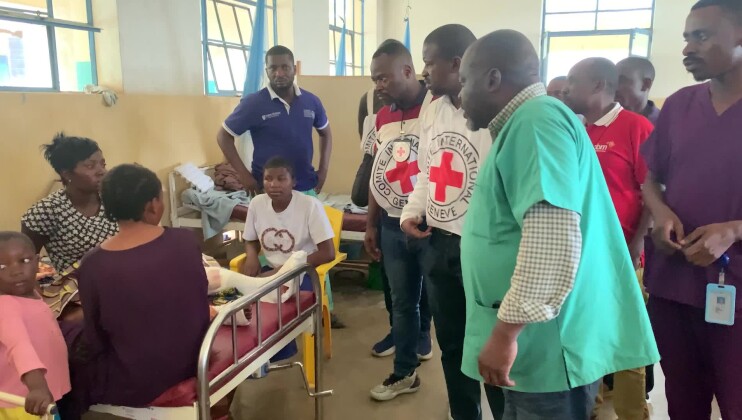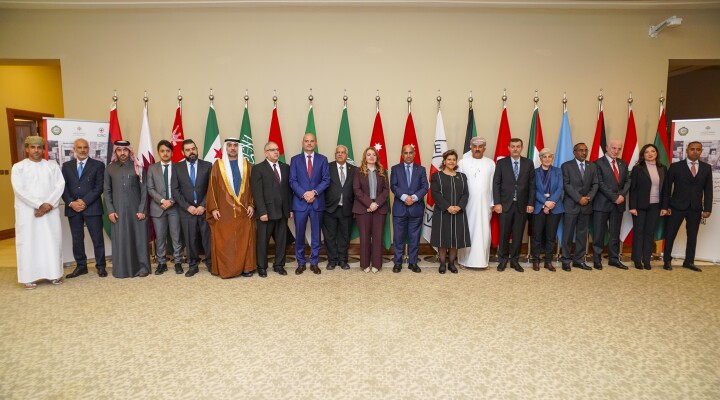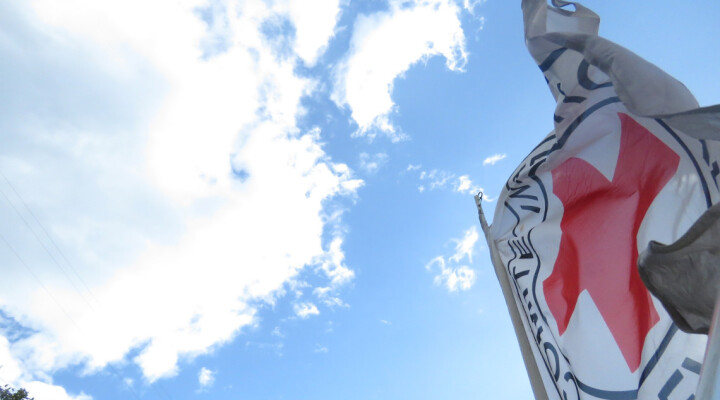Syria: Economic crisis compounds conflict misery as millions face deeper poverty, hunger
A dramatically deteriorating economic situation, a simmering COVID-19 crisis, the direct or indirect effect of sanctions and ongoing fighting in parts of the country are pushing millions of people in Syria towards deeper poverty and hunger as the tenth anniversary of the conflict approaches.
Syrians’ food security and livelihoods have been particularly affected, in a country where 80% of the population already live below the international poverty line of $1.90 per day.
When ICRC interviewed 125 families across Syria recently, 89% of respondents said their livelihood was negatively impacted in recent months, reporting job loss or a reduction in revenue and alternative sources of income. Day labourers and business owners reported the biggest impact.
“Now, due to the economic situation I have less customers. I used to have about fifty customers a month, now I only have fifteen. And people are not ordering the same amount as before, they’re only buying basic things; they’re not buying sweets and food like before,” said Farida, a widow and a mother of 3 who opened a shop through an ICRC micro-initiative project.
70% of respondents reported having no savings to support themselves, with the remaining 30% having enough savings to tide them over for one month at the most. For those who are still earning, the plunging Syrian pound and increased prices means that many basic goods are unaffordable anyway.
Since March, food prices have soared by 38% nationally. As families struggle to put food on the table, the price of bread doubled across the country and bakeries have been working overtime to meet the increase in demand. Imported goods like rice and sugar doubled or tripled in price, with a litre of vegetable oil now costing more than the average daily wage of a day labourer.
There are huge variations across governorates for many products, with milk and dairy products reportedly increasing by almost 120% in rural Damascus, for example, roughly ten times as much as in other parts of the country. People there and elsewhere told the ICRC of the stress and anxiety of not being able to provide for their families as before.
“We used to buy things at a cheap price,now the prices are over the top. We’re craving tomatoes and onions butwe can’t afford them anymore. Sometimes we manage to buy half a kilo of tomatoes; then me and Um Mohammed take a tomato each, crush it, and put it on bread with salt and eat it, said Khalil Al Falah, a 65-yearold amputee who benefited from ICRC’s micro-economic initiative
More than nine million Syrians are now considered food insecure, an increase of 1.4 million people (20%) in the past year, raising fears of hunger and undernourishment. Today, almost every second person in Syria can’t access or afford enough food in a country that was a self-sufficient, regional exporter of food prior to the conflict.
Note to editors
1. In May 2020, ICRC’s Economic Security Unit in Syria interviewed 125 households that had been previously supported by the ICRC, representing 875 people, about the economic impact of COVID-19. Market price monitoring was carried out in March and April.
2.The International Committee of the Red Cross is an independent, neutral organization ensuring humanitarian protection and assistance for victims of armed conflict and other situations of violence. It acts in response to emergencies and at the same time promotes respect for international humanitarian law and its implementation in national law.
For further information, please contact:
Sarah Alzawqari, ICRC Middle East spokesperson, +961 3138 353, salzawqari@icrc.org
Ruth Hetherington, ICRC Middle East spokesperson, +41 79 447 3726, rhetherington@icrc.org
Follow the ICRC on facebook.com/icrc and twitter.com/icrc
SHOTLIST
LOGLIST
Location: Various, Syria
Length: 10’26’’
On-screen credit: ICRC
Format: H264 HD mov
Production: Ammar Saboh, May Saad
Camera: Various
Editor: Christopher Nicholas
Sound: Arabic
ICRC ref: 20200628-Syria-Pledging
Date: 2015-2020
02:03 Babr Amr Collective Kitchen, supported by ICRC and SARC, Homs, June 2020
00:46 Khalil Al falah setting up his shop selling goods he was able to buy with the support from ICRC and SARC, Damascus, June 2020
01:10 Soundbite 1, Khalil: “I’m living in a rented house, we moved here for medical reasons. My wife has cancer, my son has been sick for four years and is in hospital, and I’m an amputee with damaged eye sight. We have one room and a bathroom and we are paying 50,000 SYP”
01:35 Soundbite 2, Khalil: “Sometimes, my wife and I go to the vegetable market to buy supplies; we buy sugar, fat, oil, canned food and then we re-sell them.”
01:51 Soundbite 3, Khalil: “Sometimes we end up using some of the products we intend to sell for ourselves; we need to eat. We’re craving tomatoes and onions, we can’t afford them anymore.”
02:01 Soundbite 4, Khalil: “I have bags of rice that I bought for 1200 SYP, but now cost 3000. We had to cook one for ourselves, I feel I don’t deserve to eat it, it’s too expensive - 3000 SYP for one bag is too expensive.”
02:22 Footage showing destruction Homs, June 2020
02:51 Street scenes from Homs, 2017
03:12 Amin, unemployed teacher, Father of four, sitting with his daughters and helping with school homework, Homs, June 2020
03:40 Soundbite 1 Amin: “If you go to a supermarket you will not be able to find basic products because of high prices.”
03:45 Soundbite 2 Amin: “Adults can find a way to cope with the situation, but you can’t deprive kids of their basic needs, especially when they ask for it.”
03:59 Soundbite 3 Amin: “We are facing huge challenges, it’s really hard to meet our basic needs with everything happening in the country.”
04:05 Soundbite 4: “As a father who usually likes to take the kids to play once a week, going to the amusement park is no longer an option. I have to really think if I have enough money to take them, kids don’t think about finances; kids usually say: I want”
04:25 Amusement park Homs, June 2020
04:39 Farida Alaloush, with her three children in Aleppo, June 2020. Farida runs a pie and sweet business with the help of ICRC and SARC
05:28 Soundbite 1, Farida: “I’m a mother of three and my husband died during the conflict. I am displaced and have no idea what happened to my house, I’m just taking care of my kids.”
05:46 Soundbite 2, Farida: “I was benefitting greatly from the project, the support I received helped me raise my kids. But now due to the economic situation I have less customers. I used to have about fifty customers a month, now I only have fifteen. And people are not ordering the same amount as before, they’re only buying basic things; they’re not buying sweets and food like before. My income has decreased which has impacted on what I can afford, especially what I can buy for my kids, like clothes for example.
06:33 Soundbite 3, Farida: “I had to cut out many things, like cleaning products, certain foods, even medicine…we don’t have an income like before.”
07:00 Water shortages: people filing up jerry cans from ICRC water trucks, Hasakah, North East Syria, 2019
07:27 Hama Main Bakery, supported by ICRC and SARC, April 2020
07:57 Asma, teacher from Hama, cooking with her children, Hama, June 2020
08:44 Soundbite 1, Asma: “When my kids ask for a specific meal, I try to cook something close with less expensive ingredients. Necessity is the mother of invention.
08:53 Soundbite 2, Asma: “Sometimes I need to cook on fire when there is no gas, so I get my kids excited, and tell them to come and taste see how amazing it is to make potatoes this way.”
09:03 Soundbite 3, Asma: “The prices have really gone up; for medicines it’s not that they are not available, but they have become really expensive. Food as well, instead of buying two kilos of food, you’ll get half a kilo.
09:18 Saghir Family, Eastern Aleppo 2015
09:41 Al Hol camp
09:54 ENDS



